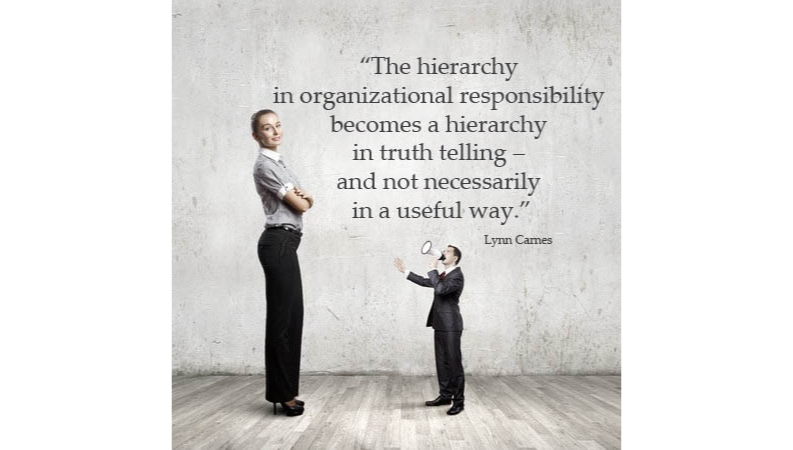He turned to me and asked “Do you think I am too vague when giving someone an assignment?” Just as I started to answer we got interrupted, so it was the next day when I brought up his question, with a question of my own. “What are you hoping to learn by asking that question?”
His answer plays out thousands of times a day in offices across the world: “Even if I’m good at it, I want to get better. In my position, it’s very tough to get real feedback. I don’t want people to shield me from the truth. I want real feedback.”
This is one of the most common conversations I have with clients operating at all levels of the organization, and especially at the top, whether in a C-Level role, as the owner of the business or as a solo entrepreneur. How do they get real feedback and more importantly, complete and true information? In what ways do messages get watered down before getting to the top? The hierarchy in organizational responsibility becomes a hierarchy in truth telling – and not necessarily in a useful way.
If you are at the top of an organization, getting real information is the difference between effective decisions and disastrous ones.
If you are trying to advance in your career, learning to tell the truth to the higher ups is a game changer.
Leaders who have significant authority, responsibility and decision making scope also tend to have people who look up to them, respect them, are intimidated by them or even fear them. The dark side of this kind of power is often the tendency for people to shield them from unvarnished information for lots of “good” reasons. It’s a dilemma that deserves to be resolved and, yes, it is tough to get real data.
One of the most telling experiences I’ve had about this dilemma happened in a room of 100 plus people, while facilitating a multi-faceted working session. When the subject of decision-making came up, someone alluded to “the answer you want to hear or the real answer.” Interested by that thread of conversation, we opened Pandora’s box (or in Texas, we call that a big, ole can-o-worms). I went from being the facilitator to the co-facilitator. The senior executive for that division stood up and began dive into the subject of setting the conditions for people to have the courage to say what he might not want to hear. We teased out the different ways he was getting filtered information. Some of the filters were useful – no executive at the top of an organization wants the full data dump. Yet as we explored, there was a very real sense of him being shielded from critical information or countervailing opinions.
That day, the executive opened himself up to real feedback about what he could do to get better information and he made a very specific request: “Please tell me the truth as you see it.” He also made a promise: “I won’t kill the messenger.”
Interestingly enough, he later shared the flip side of this dilemma. He had made his own career by taking the risk to speak truth to those higher in authority than him. It distinguished him enough to spend his entire career ten to fifteen years ahead of his career age group.
Are you being shielded from truth? Are you getting real feedback? What is your response to bad news? Do you praise those who agree with you and show less favor to those who don’t? What mechanisms do you have in place to get the best information possible, including countervailing opinions? How do you distinguish between data and opinion? How do you encourage people to speak their minds?”
One of the greatest flaws in decision-making is thinking you have all the information when you don’t. Getting better at anything depends on getting real feedback. Lacking the truth, both decision-making and learning suffer. And keeping quiet when you have something important to say is just as grievous.
There are the tactics to make all of this happen and then there reasons why you don’t. If you are interested in better understanding yourself and what makes you speak up or be quiet, or what makes you “shoot the messenger” or unconsciously suppress information, set up an OnDemand Coaching call with me.
Know someone who would love this article? Email or share below!Lynn Carnes accelerates change and unleashes leadership performance in organizations, especially in context of challenges without easy answers. She loves to hear about how your experiments with these ideas turn out. To contact her or share your experiences email lcarnes@carnesassociates.com.
Know someone who would love this article? Share it with them.

